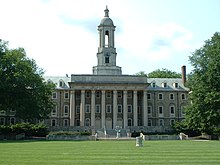 |
| Left to right: Rich Pancost, Sir John Beddington, Paul Bates |
My first month also confirmed that we have vital, illuminating and challenging ideas to share and we will all benefit from improved communications. Hence, this blog post and the many to follow it. There are many buried treasures, both clever insights and mature wisdom, on the Cabot Blog, and I encourage new visitors to explore those past posts. For example, see recent posts on Food Security by Boo Lewis and Energy Markets by Neeraj Oak. As for me, I’ll be bringing in a combination of personal observations and insights arising from discussions with Cabot partners, as well as ideas emerging in my own discipline.
 |
| Penn State University |
 |
| Ultimate frisbee GB masters beach team (2007) |
I examine organic compounds in a wide range of materials, from soils and plants to microbial mats to ancient rocks. Those organic compounds can be exceptionally well preserved for long periods of time, allowing us to investigate aspects of how the Earth’s biological and chemical systems interact on time scales from tens to millions of years. The topics of my research range from understanding the formation and fate of methane to reconstructing the climate history of the planet (especially during times when carbon dioxide levels and temperatures were higher than those of today). It requires working with a diverse group of people, including climate modellers, mathematicians, social scientists and petroleum geologists. Those themes will become more prominent in this blog over the coming months, especially as I report back from a few conferences and around the release in late September of the Fifth Report from IPCC Working Group 1: The Physical Basis of Climate Change. But I will also be discussing Environmental Uncertainty and Decision Making: what it means, my personal perspectives on it, and why it is at the heart of the Cabot Institute’s mission.
Finally, this is meant to be an interactive forum. Do use the comments section and do suggest future topics. We especially welcome suggestions from our fellow Bristolians for potential visitors and events we could organise in our home town.
Cheers,
Rich
This blog was written by Professor Rich Pancost, Cabot Institute Director, University of Bristol
 |
| Rich Pancost |
